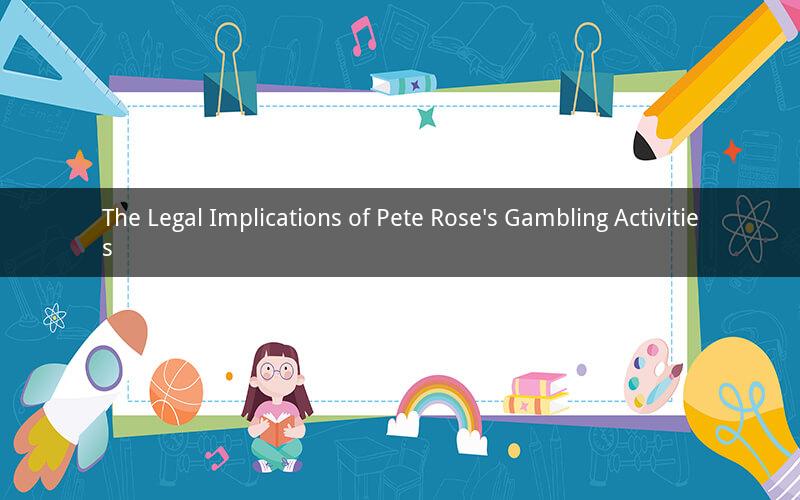
Pete Rose, the Hall of Fame baseball player, has been a subject of controversy for decades, primarily due to his gambling activities. The question of whether his gambling was illegal has been a topic of debate among sports enthusiasts, historians, and legal experts. This article delves into the legal implications of Pete Rose's gambling, examining the laws that governed gambling during his playing days and the consequences he faced as a result.
I. Historical Context of Gambling in Baseball
During the era when Pete Rose played professional baseball, gambling was a pervasive issue in the sport. The 1919 Black Sox Scandal, where members of the Chicago White Sox were accused of throwing the World Series, had a lasting impact on the perception of gambling in baseball. Despite the efforts of the league to crack down on gambling, it remained a persistent problem.
II. Pete Rose's Gambling Activities
Pete Rose's gambling activities became public knowledge in the 1980s when he was banned from baseball for life by Major League Baseball (MLB). According to the investigation conducted by MLB, Rose had bet on baseball games, including those involving his own team, the Cincinnati Reds. While the exact amount of money he bet was never disclosed, it was clear that his gambling was extensive and involved multiple sports.
III. The Legal Status of Gambling in the United States
To determine whether Pete Rose's gambling was illegal, it is essential to understand the legal status of gambling in the United States during his playing days. At that time, gambling was largely regulated at the state level. While some states had laws that prohibited gambling, others allowed it to varying degrees.
A. Federal Laws
At the federal level, the Wire Act of 1961 made it illegal to use wire communication to place bets on sports events. However, the act did not explicitly ban gambling itself. This left the legality of gambling up to state laws.
B. State Laws
The legality of gambling in each state varied greatly. Some states, like Nevada, had legal casinos and other forms of gambling, while others had strict anti-gambling laws. In Pete Rose's case, the state of Ohio, where the Reds played, had laws that made gambling illegal.
IV. The Legal Implications of Pete Rose's Gambling
Given the legal context of the time, it is possible that Pete Rose's gambling was illegal under Ohio state law. However, proving his guilt in a court of law was not the primary concern for MLB. Instead, the league focused on the damage Rose's actions had on the integrity of the sport.
A. The MLB Investigation
MLB conducted an extensive investigation into Rose's gambling activities, which included interviews with witnesses and review of betting records. The investigation concluded that Rose had bet on baseball games and that his actions had the potential to influence the outcome of games.
B. The Ban from Baseball
As a result of the investigation, MLB banned Rose from baseball for life. The league's decision was based on the belief that Rose's gambling had compromised the integrity of the sport and that he had betrayed the trust of his teammates, the Reds organization, and the fans.
V. The Aftermath of the Ban
Since his ban, Pete Rose has been a polarizing figure in baseball. While some believe that he deserves a second chance, others argue that his actions were too serious to be overlooked. The debate over whether Rose's gambling was illegal has also continued to generate discussion.
A. The Legal Challenges
Rose has challenged his ban in court, arguing that MLB had overstepped its authority and that his gambling was not illegal under Ohio state law. However, the courts have consistently upheld the league's decision.
B. The Legacy of Pete Rose
Despite the ban, Rose remains a legendary player in the eyes of many baseball fans. His achievements on the field, including his record 4,256 hits, are undeniable. However, the shadow of his gambling activities continues to cast a long shadow over his legacy.
In conclusion, the legality of Pete Rose's gambling activities during his playing days is a complex issue. While it is possible that his actions were illegal under Ohio state law, the primary concern for MLB was the damage Rose's gambling had on the integrity of the sport. The ban from baseball remains a testament to the league's commitment to preserving the integrity of the game.
Questions and Answers:
1. Q: Did Pete Rose's gambling activities involve betting on games involving his own team?
A: Yes, the MLB investigation found that Rose had bet on games involving the Cincinnati Reds.
2. Q: What was the primary reason for Pete Rose's lifetime ban from baseball?
A: The primary reason for the ban was the damage Rose's gambling had on the integrity of the sport and the betrayal of trust to his teammates, the Reds organization, and the fans.
3. Q: How did the state of Ohio regulate gambling during Pete Rose's playing days?
A: Ohio had laws that made gambling illegal, which could have made Rose's gambling activities illegal under state law.
4. Q: Has Pete Rose ever challenged his lifetime ban from baseball in court?
A: Yes, Rose has challenged the ban multiple times, but the courts have consistently upheld the league's decision.
5. Q: How has Pete Rose's legacy been affected by his gambling activities?
A: Despite his remarkable achievements on the field, Pete Rose's gambling activities have cast a long shadow over his legacy, with some fans and historians questioning his Hall of Fame eligibility.